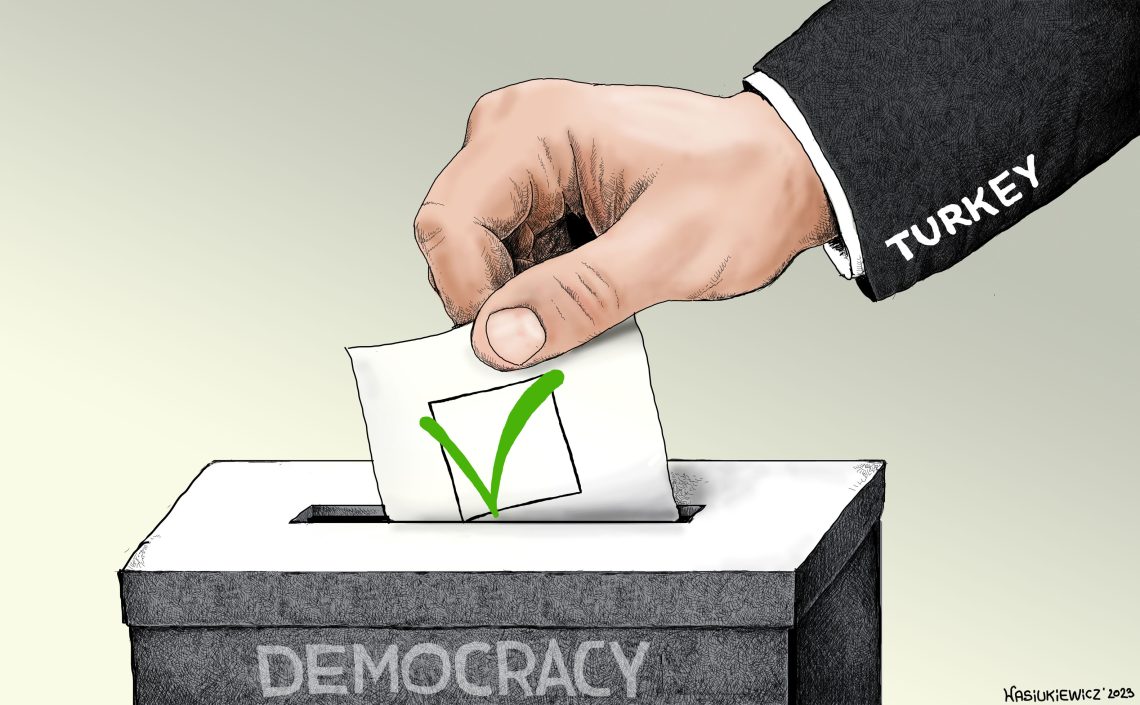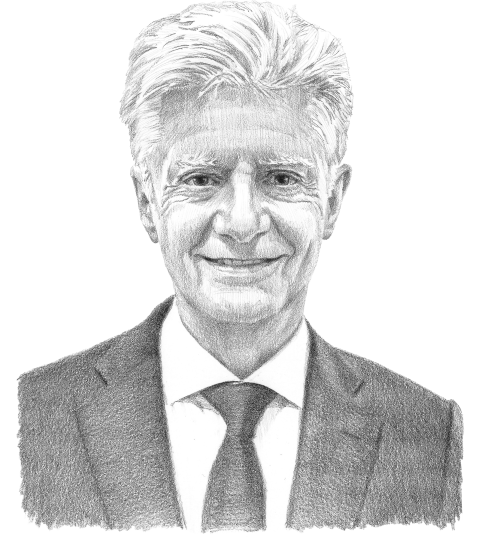Turkey’s elections and political continuity
Even with a change in presidential leadership, Turkey’s foreign security policy is unlikely to undergo a dramatic change.

Turkey has voted, proving its democratic nature despite some authoritarian elements. For the first time in Turkish history, a runoff election has become necessary, as none of the parties secured the required 50 percent of votes plus one. The results show a comfortable margin for the incumbent. While many people abroad fear that President Recep Tayyip Erdogan holds near-dictatorial powers, the Turkish population is able to enact changes. In recent years, municipal elections led to opposition members leading the country’s two largest cities. Turkey’s institutions continue to function effectively.
The elections, characterized by high voter turnout, were conducted peacefully despite a polarized campaign. The challenger, Kemal Kilicdaroglu, enjoyed the support of an array of political parties, each with distinct, sometimes opposing, orientations, united by their common goal of unseating President Erdogan.
Criticism of President Erdogan in the West primarily stems from concerns over Islamic policies, human rights issues, especially media freedom and significant apprehension over his foreign and security policies. Consequently, many in the West were hopeful for a change. However, regardless of the final election outcome, the paradigm shift in foreign policy introduced during Mr. Erdogan’s tenure is likely to persist.
The expanded religious freedom for Islam, which has been a hallmark of the Erdogan years, is unlikely to be rolled back. This continuity will be driven not only by circumstances and political necessities but also by the fact that the ruling coalition has maintained a parliamentary majority. Despite more significant executive power being attributed to the presidency over the past decade through constitutional reforms, the Turkish parliament continues to play a crucial role in legislation.
Turkey’s geopolitical evolution
In its present form, Turkey was founded after World War I by Mustafa Kemal Pasha, who later received the title Ataturk (Father of the Turks). He created a secular state, strictly limited the power of Islam and designated the army as the guarantor of the constitution. Turkey developed into a democratic country modeled after Western examples. In some instances, when governments deviated from the original constitution, the army intervened to restore constitutional order. This role was discontinued under pressure from the European Union.
Having lost the Ottoman Empire, Turkey focused on internal development and defending its integrity. During the Cold War, Ankara joined NATO and was an essential partner in containing the aggressive Soviet Union.
Turkey’s strategic position between Europe and the Middle East, and between the Mediterranean and the Black Sea, forced Ankara to focus on geopolitics. The end of the Cold War and the implosion of the Soviet Union allowed Turkey to improve its relations with Central Asia and develop trade with Russia and Ukraine. Ties with Russia have been fraught with tension for centuries.
Erdogan’s pragmatic leadership
Mr. Erdogan, a very able mayor of Istanbul in the 1990s, was arrested and jailed for publishing a poem considered too religious by the government. Still, he was able to found the Justice and Development Party (AK) and became prime minister in 2003, serving for 11 years. In 2014, he assumed the office of president, which he has held since. In his nearly 20-year rule, he has strongly influenced Turkey. His early economic policies attracted more foreign direct investment and eased various economic constraints. He also initiated discussions with the Kurdish population to alleviate tensions and began accession negotiations with the European Union. A few years later, he dropped some of the rules limiting Islam.
Taking into account Turkey’s strategic position and the increasing instability in the neighboring area, a proactive foreign policy became necessary. Turkey has the second-largest army in NATO after the United States. The wars in Iraq and Syria were a significant challenge, and Turkey could not remain a silent observer. To protect the country’s security, Ankara had to intervene in Syria. The Kurdish regional authorities in Syria are closely linked to the Kurdistan Workers’ Party (PKK), which has carried out terrorist attacks in Turkey and is considered a terrorist organization by Turkey, the European Union, and the U.S.
Because of its location, Turkey’s interests are not always the same as those of other NATO countries. However, Turkey has always been a loyal and useful member of NATO, while maintaining a certain degree of strategic independence. This independence allowed Ankara to arrange continued export of grain from Ukraine during the war.
The West’s understanding of Turkey’s needs is limited. As a result, it is necessary for Ankara to take precautions to maintain its strategic independence. This led Turkey to purchase the S-400 missile system from Russia, as it cannot be totally dependent on the U.S.
More on Turkey
The risks of ignoring Turkey
As Turkey begins its second century, uncertainty looms
President Erdogan was criticized for blocking the accession of Sweden and Finland to NATO; however, it must be recognized that the two countries have sheltered and protected PKK supporters. Turkey has a complex relationship with Russia. Ankara even shot down a Russian fighter plane a few years ago. Tensions run high between the two powers in the Black Sea area, the Caucasus and the Middle East, especially in Syria. Nevertheless, Presidents Erdogan and Putin have opted for a pragmatic approach, and regularly hold talks despite this friction.
In the West, it is often said that President Erdogan and Turkish politics are erratic and unpredictable. However, this perception is inaccurate; Mr. Erdogan is a pragmatist who adapts quickly to situations. By understanding Turkish interests, his foreign policy actions become predictable.
Prospects for Turkey’s political landscape
A change in the presidency will not drastically alter Turkey’s foreign and security policies, as the country will always protect its interests and relies on solid institutions. Changes might occur in economic policies, however.
In terms of internal politics, media freedom might improve with a change in the presidency. Still, newcomer Kemal Kilicdaroglu, a staunch nationalist, is likely to make it difficult for the media to maintain a strongly critical view of the government. Turkey will not revert to the purely secular country established by Ataturk. That state of affairs was formerly guaranteed by the army, but the EU insisted on reducing the Turkish military’s political influence during accession talks. This gave President Erdogan the opportunity to strengthen the presidency and increase the influence of Islam. However, there is no risk of radical Islam becoming dominant in Turkey.
The failed coup in 2016 demonstrated the resilience of Turkish institutions, though this was reported differently in most European media. It is accurate that President Erdogan used his opponents’ mistakes to suppress the Gulen movement. A highly dogmatic Islamic group, the organization gained significant influence within institutions, academia and education. It is doubtful that a new government would substantially change the policies in place to contain Gulenists. Mr. Kilicdaroglu, a staunch secularist, is unlikely to allow a resurgence of the Gulen movement.
Turkey’s regrettably aggressive monetary policy in recent years has resulted in high inflation, a factor that could negatively affect the incumbent president. Moreover, criticism has surged over compliance with building standards following the devastating earthquake that caused significant damage and casualties. Both of these issues pose substantial liabilities for the current administration.
Several factors decisively influenced voters. Both candidates proclaimed their nationalism, prompting the question: who is the better nationalist? The incumbent, a patriot who respects Ottoman traditions and practices a moderate form of Islam, contrasts with the challenger, who aligns himself with the secular tradition of Kemal Ataturk. This divergence has sparked further debates on secularity and religion. The incumbent also faced significant challenges due to the aftermath of the earthquake and the pressing issue of inflation, which had tactical implications in the election.
While many in Europe hope for change, they might be disappointed. Rather than dwelling on unfulfilled hopes, it would be more beneficial to foster a relationship based on mutual understanding. Turkish pragmatism has demonstrated its effectiveness.
A new administration in Ankara could find itself in a difficult position, as its support would be based on parties with conflicting principles and interests united primarily by their opposition to Mr. Erdogan. Furthermore, supporters of the incumbent retain a legislative majority. This could result in even more “unpredictable” governance, perhaps also less pragmatic.
While the tone of Turkish politics may change under Mr. Kilicdaroglu, its essence will remain the same. Regardless of the outcome of the runoff elections, relations with Turkey will continue to be essential for Europe.


